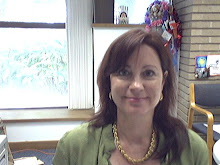Friday, August 22, 2008
Resources from blog moved to web page
http://www.sph.uth.tmc.edu/charting/handouts/ebph_handouts/ebph_workshop.htm
I'm going to maintain the blog, just in a slightly different way. I'd like to add more EBPH newsy links to the site, stuff not necessarily related to my workshops. We'll see. I'm kind of busy, it gets hard to look for things.
But, here's a thought-- I may just try looking for something public health related, something topical, and ask for comments. Dunno. What do you think? How do you think this blog can be best utilized?
Tuesday, August 12, 2008
More about the week 4 workshop
We spent one week on data gathering and one week exploring literature databases. During the last session, I covered resources with a consumer-health bent. I did that because so many PH workers are in clinics, work with clinic staff, put on health fairs, or need to design programs for the public.
However, now that the data is gathered and the literature has been researched, it's time to review the last 3 steps of the EBPH process:
4.Develop program or policy options
5.Create an implementation plan
6.Evaluate the program or policy
I don't have anything new for steps 4 or 5-- put those health theories to work and revise your logic models. But, the evaluation part has been in the back of my mind. I see this as something that can really make or break a program. After all, you can put together the best intervention ever seen but if you don't have the data to support it you won't get refunded!
So here are a few links to evaluating your programs.
CDC Evaluation Working Group: Framework for Program Evaluation
WK Kellogg Foundation Evaluation Handbook
Association for Community Health Improvement: Outcomes Measurements
The latter item is a meta-site-- it points to bunches of other resources. I don't normally like to do that, but they've pulled together a great list of outcomes measurements.
I want to give a big THANK YOU to my Tuesday group. They were great-- stuck with me through these 4 weeks. We had a hurricane last week (well, sort of-- we thought we were going to have a hurricane!) but other than that they were here for each class, asked questions, made comments-- I really had a good time. I hope they did as well.
Questions or comments to this or any post can be published through the blog or sent to me directly from the Ask-A-Librarian link in the upper left corner of the blog.
Last week of workshops!
My first group is almost finished with the 4-week session. I have had so much fun! I have 2 more classes-- today and Thursday. Same topic-- additional resources. Yeah, not much of a name but that's what we're covering.
What are the resources?
◦MedlinePlus (NLM)
◦ToxMap (Texas) (NLM)
◦Household Products Database (NLM)
◦Partners in Information Access for the Public Health Workforce
Why these?
MedlinePlus is *the* best source for consumer health information. If you're working in a clinic or you have practitioners who work in clinics, you can point your patients and their families to MedlinePlus. Excellent prescription drug information, great links to handouts, and lots of pointers to *local* resources. The last item refers to the Go Local project sponsored by the National Library of Medicine. Local health sciences libraries have joined in on the project and created awesome directories of services.
ToxMap is one of my favorite NLM projects. If you want to see where the big polluters are, go to ToxMap. If you want to know the health effects of the pollution around you, go to ToxMap. If you want to see the historical trends of the polluters around you, go to ToxMap.
Another favorite site of mine is the Household Products Database. You can look up products by name brand, by ingredient, or by manufacturer. You can even look up products by health effect. Try it-- go to the link above and look up "asthma".
Lastly, the Partners in Information Access for the Public Health Workforce site is an attempt (and a very well done attempt at that!) to link the PH workforce to key resources that they may find useful in their positions. Training, conferences, health education/promotion resources, data, grants-- you name it and if it's of benefit to PH, it's there.
That's all for now. Recordings for the presentations will be posted later.
